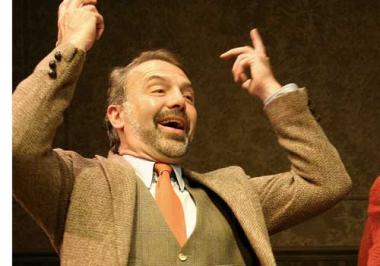Arthur Miller is considered by many to be America's Greatest Playwright, with only Eugene O'Neill and Tennessee Williams the other obvious contenders for the crown. Interestingly, all three were prolific dramatists but their reputations are founded on less than a handful of major works. Miller's rests primarily on two tragedies of the ordinary man, Death of a Salesman and All My Sons, and his McCarthy-era witch-hunt allegory, The Crucible.
Though he continued writing into his 80s (he died in 2005 at 89), Miller never equaled the critical and commercial success he achieved in the 1940s and '50s. For years, he was known more for being the husband of Marilyn Monroe, to whom he was married for five years, and for his defiance of the House Un-American Activities Committee.
In the 1980s, after a couple of decades of meager success and hostile reviews, Miller produced a series of one-act plays that encapsulated some of his constant themes: personal honor, suspicion of the status quo, the elusiveness of memory, the fragility of human connection. Three of these plays—well, two and a half—are currently on stage at the Actors Theatre Playhouse, the adventurous community theater housed in a historic New Hampshire meetinghouse just across the river from Brattleboro. Each of the two-handers in this triptych sheds a different light on the playwright's craft, and each has a different director, but they hang together nicely as a coherent whole.
The opener is the first scene from a longer one-act, The Last Yankee, about two patients in a mental hospital who are visited by their husbands. In the first scene, which works pretty well as a stand-alone playlet, the husbands meet in the waiting room. The older man, Frick, is materially successful, complacent, baffled and impatient with his wife's condition, and disturbed to discover that the younger man, Hamilton—a descendant of Alexander Hamilton, no less—is a mere carpenter with little personal ambition. Hamilton, however, has more self-awareness than the other man, and a genuine concern for his wife's troubles.
The message here is a bit pat—success is measured not by wealth or position but by more intangible assets. But both actors, under Marilyn Parpan's direction, bring credible personalities to the situation. Bill Pearre is appropriately stuffy and uncomprehending as class-conscious Frick, and Richard A. Epstein gives a nice edge to the unpretentious working man who is finally driven to rage by the older man's condescension.
The closing piece is a bittersweet comedy, I Can't Remember Anything, co-directed by Jerry Levy and Rupa Cousins. It's about two old—really old—friends. Leo is a crotchety antique who can barely get around but retains more of his marbles than his elderly neighbor, Leonora. They are apparently each other's only friends, since everybody they used to know is dead. She drops by daily to drink his whiskey and talk about the past. In their circling conversations, she keeps losing the thread and he exasperatedly knits it up for her.
The play whimsically explores the loops and knots of time and friendship, and never really goes anywhere—which is part of the point. There's a hurtful confrontation near the end, but by the time Leonora gets home and phones to say she's driven the 100-yard distance safely, she's forgotten what he said, and we know that this will all happen again tomorrow.
Mark Ziter and Nancy Groff are both delightful, he creaky and long-suffering, she with a deceptively energetic demeanor and a bright-eyed gaze that keeps going fuzzy. But both performers are much younger than their characters, and they can't quite capture a lot of the humor—and pathos—that attaches to this dance of extreme old age.
These two pieces bookend the evening's most interesting play—interesting both for its stylistic daring and its autobiographical echoes. In Elegy for a Lady, an unnamed man enters a small boutique and asks the unnamed proprietress, "Do you have anything for a dying woman?" The man is married, and the intended recipient of the memento mori is his mistress, a woman much younger than he—as is the storekeeper.
As the man pours his story into the stranger's sympathetic ear, we gather that the lover may not actually be dying but perhaps just thinks she is, or that perhaps he just thinks she is. The proprietress slowly becomes a canvas for the man's feelings about the impossible affair, including his insecurities about the age difference between them.
The title is tricky, for the "lady" of this elegy is not the lover or the shop owner, but Marilyn Monroe, who died the year after she and Miller divorced and was more than a decade younger than he. In the script, Miller carefully specifies the proprietress' costume, which is what Monroe was wearing the day they met.
Elegy is the most engaging of the three plays, and so are the performances, under the sensitive direction of Burt Tepfer. Francis Hauert is poignantly effective as a man helplessly in love with someone who is more dream than substance, a beautiful hopeless illusion. Hallie Flower, in the evening's most challenging role, gives its most impressive performance.
Miller isn't known for his female characters, to put it mildly. Many of them tend to be helpless witnesses to his male protagonists' struggles. Here, the proprietress is quite literally a blank slate. He acts, she reacts, and then evolves as she willingly takes on the lover's role. Flower is so completely present on stage, so exquisitely detailed in gesture and expression, that even though Hauert has most of the lines and all of the "story," she gets at least an equal share of our attention.
An Evening of Arthur Miller One-Acts: Sept. 17-19, 7:30 pm, Actors Theatre Playhouse, Brook and Main Streets, West Chesterfield, N.H., (877) 233-7905, www.actorsplay.org.



